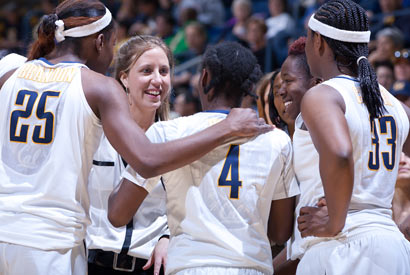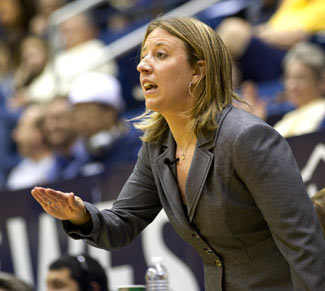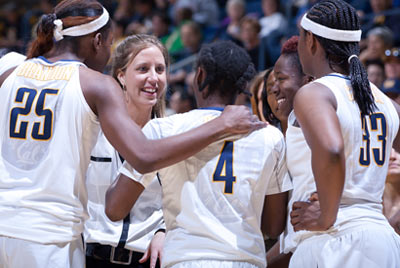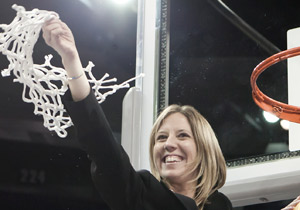Bears’ winning formula? Aim high, don’t forget to dance
Head coach Lindsay Gottlieb, 35, has just led the women’s basketball team to the NCAA Final Four. In a Q&A, she talks about personal influences, her approach to mentoring student-athletes and connecting with fans, and what makes Cal's diverse team click.

April 2, 2013
“Right now there’s no reason we can’t be one of the top programs in the country,” second-year coach Lindsay Gottlieb said in an interview with Public Affairs late last week. Then came the Bears’ nail-biting 65-62 overtime win against Georgia on April 1, sending the Cal team higher than it’s ever gone before: to the Final Four in the NCAA women’s college basketball tournament.
Former associate head coach of the Cal program, Gottlieb left Cal to lead UC Santa Barbara’s team in 2008, returning to Berkeley as head coach in 2011. She takes the team to New Orleans for the Final Four contest Sunday, April 7, with the championship title to be decided there on April 9.

Head coach Lindsay Gottlieb (Courtesy of Cal Athletics)
Gottlieb, 35, talks here about personal influences, her approach to mentoring student-athletes and connecting with fans, and what makes Cal’s diverse team click.
Q. You’ve called this your dream job. Do you think of yourself as having a big goal, bigger even than winning games?
A. I see it as my mission to take Cal basketball to the next level, and make this one of the premier programs in the country. There’s a lot of ways to do that. Obviously you have to put great players on the floor, and run great plays.
But I feel like there’s a shift going on in women’s basketball, where many of the pioneers of the game are getting close to retiring. So there’s an opportunity to help shape what this program looks like going forward.
It’s my nature to be open, and to use technology and the newest forms of social media. We wanted to visually open the windows on this program – to show what the players are about, our style of play and human interaction day to day. For me the best way to do that is via the website, thisiscalbasketball. Many coaches are closed off in how they run things: “This is a private thing; you just watch the games.”
On the power of positive coaching
On the power of positive coaching
I hope we have a lot of seasons like this one, where we win 30 games. But it doesn’t always happen. Through our outreach, I hope to help people understand that the experience of a student-athlete is about everything that happens every day, and the games are a byproduct of that.
Q. Presumably the use of social media, and videos of the team, helps fans connect as well.
A. Yes. The website, combined with our use of Twitter and Facebook, is a way for people to get acquainted with who we are in a bit more intimate way. There are a lot of other ways too, such as watching us play on TV, and learning about UC Berkeley.
In women’s basketball, we have to continue to cultivate people to be interested. It’s not like the NFL, where you just put out a schedule and 40,000 people come. Once we get people interested, they’ll become invested, because of the likability of the Cal players. The quality of our game is really good, but you have to sell people on that.
Q. What qualities and skills does coaching require of you?
A. As a head coach, the first thing, above all else, is that you have to care about the young women in the 18-to-22 year-old age group. No matter how much you know about the game of basketball, if you don’t care about the people you coach, it’s going to very tough.
We’re educators. We teach them basketball skills and strategies, and how to handle a lot of different life situations — how to respond after losing a game, or when people think you’re going to win, or when people say bad things about you, and how to handle teammates.
There are also a lot of technical things involved. You have to know the game and how to teach the game. You have to be innovative in terms of what’s going to work for your team this year. You might need to reevaluate what’s working and not working.
One thing people don’t tell you is that being head coach is like being the CEO of a small company. You have to be able to manage situations, people, to delegate and still have a sense of what’s going on, because ultimately you’re responsible for everything.
I think we all should have a degree in psychology. And you have to be tireless, because you don’t get a lot of sleep when you’re trying to recruit and prepare your current players and mentor and everything else.
Q. Are there members of your family or experiences in your life that have prepared you for the role?

Coach Gottlieb in action (Courtesy of Cal Athletics)
A. The No. 1 thing I was given by my parents was a mentality that you can do whatever you want. There was an expectation that we would take on whatever we were taking on at a high level. But there was never pressure to be anything other than what we wanted to be. I really appreciate that. It allowed me to pursue what I found most exciting.
I think good communication probably comes from my father. He was involved in politics; I was around that quite a bit. We would go hear people speak. My parents encouraged us to read, debate, talk, think and communicate. All of those are life skills that I apply to my day-to-day profession in coaching.
Q. How do you see the role of a coach in the life of a young student-athlete?
A. There’s not enough time or words to explain that – and I say that with a lot of gratitude. It can be so many things. To a lot of the players, I play the role of another parent. They all have support systems and people in their lives. But I’m probably around them more than other adult figure – more than their professors or their families. So I take that really seriously.
And there’s being a mentor. Because I’m a younger coach, my role can be big sister-ish, more than parental. It’s someone to bounce ideas off of, to push you to be better, and someone to believe in you.
Q. There must be a tension between athletics and academics at times.
A. Not for me. You just have to create a culture where there’s absolutely no question that the academic piece and the athletic piece are equal. And do everything to set up a situation where players can achive at the highest level in both.
My aim is for the players to have a great experience while they’re here. And “great experience” doesn’t mean that every second is fun. Running sprints is not fun at times; writing a paper is not always fun. But college athletics shouldn’t be a horrible experience, where 10 years later you go, “Oh yeah, I did get a lot out of that.” Players should enjoy it. They shouldn’t feel bad about themselves; they shouldn’t feel like they’re never good enough.

Celebrating Cal’s win over Georgia in the Spokane Regional (Courtesy of Cal Athletics)
I try to model the behavior I want – balancing multiple things. I try to talk about things outside of basketball. They joke that I watch so much film. But I also watch the news and read real books. I try to weave in current events and cultural things when I think it’s important. We have a team that’s very socially conscious and interested in the world. But there’s also a lot of dancing that goes on – pre-game, on the buses. Imagine if you were around a group of people who danced every single day and laughed every day. Being happy is a factor.
Q. Your style of coaching comes across as very positive.
A. When we’re not good, I say we’re not good. When we have something to correct, we make those corrections.
But I absolutely believe that young people, particularly young females, respond to the positive. We try to empower them to be as good as they can be. Sometimes you have to be critical in order to get there. But overall the approach is to show them what we can do, and to believe in that. During the games, I don’t believe it’s helpful to scream about something that has already occurred.
Q. How do you create trust among players from very diverse backgrounds?
A. We do have an incredibly diverse team – diversity of backgrounds, experiences, personalities. I think the No. 1 thing is to get a group of people committed to one goal.
A lot of coaches have a more strict “you have to look this way all the time” or “you have to be the same.” With me, on days when I say “wear casual attire,” some of them are going to wear skinny jeans and some are going to wear baggy jeans. That’s OK with me, because I know that when they put the “California” on their chest, they’re committed to one goal.
Obviously we dress the same in the airport and there’s a uniformity to certain things about a team. But I’m comfortable with the differences in their personalities, and embrace that. Because I think that creates a truer bond.
To get players to trust in what we’re doing, they have to know that I care about them beyond basketball. To try to get them to play defense a certain way, with no interpersonal connection – that gets old really fast.
We take the time to talk to team members, away from basketball – whether it’s going to lunch or their coming in to the office to chat. That’s the only way I know as a coach. I can’t imagine showing up for practice and treating them as robots or machines.
We have a team where there’s a lot of respect and tolerance for one another – a genuine caring. A lot of teams lack that. For us it’s real.